

Discover more from Communiqué
Communiqué 11: What do Big Brother Naija and the Super Bowl have in common?
It may appear absurd to compare it to the Super Bowl. However, a game show that receives 915 million votes from an audience of 309 million during a global pandemic is worth paying attention to.
Big Brother Naija (BBN), Nigeria's version of the Dutch reality TV competition franchise, will hold auditions for its sixth season from May 3 to 16, 2021. Last season was huge, and this season has every chance to be even bigger. The winner will earn N5 million more in prizes than last year’s winner (bringing the prize up to N90 million).
I watched the show religiously for the first time in 2020, and I could see why it has legions of fans. For months, it dominated social media conversations, garnering over 1 billion impressions on Twitter and Facebook. Big Brother Naija is prime television. Besides religion and politics, nothing else drives engagement and conversations like it.
On the surface, it may appear absurd to compare it to the Super Bowl, the annual championship game of the National Football League (NFL) and the most-watched television event in the United States. However, when a game show receives 915 million votes from an audience of 309 million (according to DSTV Media Sales figures) spread across the continent during a global pandemic and an impending economic recession, it is worth paying attention to.
The Super Bowl is the most-watched single station broadcast in US history, and its record viewership came in 2015 with an average of 114.4 million viewers. BBN pulled in more than double that last year. In comparison, the average viewership of the most-watched FIFA World Cup Finals is 562 million (Brazil 2014).
This is a monthly newsletter about the media business in Africa. Subscribe so you don’t miss any updates:
Similarities between Big Brother Naija and the Super Bowl
1. Both are prime television real estate.
Big Brother Naija and the Super Bowl are at the pinnacle of television programming in their respective markets. The Super Bowl is America’s most-watched television event. In Nigeria, it’s BBN, especially on eviction nights when housemates (as participants are known) are eliminated. However, BBN’s audience extends beyond Nigeria into several African countries, including Angola, Botswana, Cape Verde, Central African Republic, Djibouti, Kenya, Somalia, South Africa, etc.
In addition to having a large audience, both shows dominate conversations in ways that few other topics can. They produce and are products of cult followings. Fans talk about their favourite teams and housemates with strong emotions that are impossible to overlook.
2. Both rake in enormous advertising revenue.
Category sponsorship of BBN costs N750 million ($1.5 million*) while product sponsorship costs N200 million ($416,666*), and each season (which lasts 90 days) has multiple sponsors. This does not include other sponsors who pay as much as N50 million ($104,167*). The sponsorship packages include 30-second ad slots, product integration, online activation, and other offerings.
* = Parallel market rate (N480/$1)
Super Bowl advertising goes for as high as $5 million for 30 seconds. In 2020, advertisers spent $449 million on in-game advertising, up from $339 million the previous year.
However, this is where their similarities end. While the Super Bowl’s producers and advertisers have learned to leverage the programme’s elite status, Big Brother Naija’s producers and advertisers are yet to realise the extent of their power.
This is a monthly newsletter about the media business in Africa. Subscribe so you don’t miss any updates:
Television advertising in the age of social media
For a programme that airs in 49 African countries, Big Brother Naija can and should do better with the quality of its advertising. This is important because what happens on television does not stay on television. People watch things and talk about them with their friends or online, a concept now more pronounced with the advent of social media.
There is a link between traditional television advertising and online social media conversations, as a study in the Journal of Advertising Research found. It concluded that the relationship is mutual and that both media platforms work together to enhance brand engagement. When people watch something they like on television (a show, movie, advert, etc.), they are more likely to talk about it online. This essentially converts paid media into socially-driven earned media.
For example, a TV show that airs to a large audience on Sunday night will likely be the main topic of discussion on social media by Monday morning. You see this often with some shows from Africa Magic, Game of Thrones, How to Get Away with Murder, The Men’s Club, Skinny Girl in Transit, etc. Talking about the shows online generates a ripple effect, attracting more attention and eventually converting interest into viewership. The same holds true for advertising. People see great ads during major TV events, they talk about them online, resulting in more publicity and exposure for the advertised product.
Super Bowl advertisers have understood this over the years, to the point that Super Bowl advertising has become its own sport. Advertisers ensure their ads are of the highest quality and are engineered for virality. Year after year, trade publications and mainstream media rank and review the ads, and advertisers battle to top the lists. Essentially, they know that if they play their cards right, the money invested in those 30-second ads will lead to significantly higher exposure online that they would otherwise have paid for. But this was not always the case. Super Bowl advertising was not always the sport that it is today. It took a special ad from one company to break ground and show others what was possible.
Apple’s ‘1984’ ad and the re-invention of Super Bowl advertising
On January 22, 1984, Apple aired its blockbuster ‘1984’ advert during the third quarter of the Super Bowl. That created the template for what Super Bowl ads are today: cinematic, engineered for virality, and optimised for social engagement.
According to the Wall Street Journal, “The ad sparked a creative revolution among advertisers and garnered massive media attention.” To the extent that “by the 1990s, companies sought bragging rights for making the best ad of the night.”
Long before social media democratised virality, ‘1984’ sparked controversy, caused debate, and shattered everyone’s perception of what a conventional Super Bowl commercial should be. It also helped the organisers and the advertisers realise the programme’s full potential. From then on, the cost of advertising in the Super Bowl ballooned. Advertisers employed tactics to outdo one another, some going as far as reserving the bulk of their annual advertising budget for those 30 seconds alone.
This is a monthly newsletter about the media business in Africa. Subscribe so you don’t miss any updates:
What does this have to do with Big Brother Naija?
Advertisers in Nigeria are notoriously biased towards functionality, and this is understandable. Psychographic analysis of the average person in the mass audience shows that they will almost always prioritise what a product or service can do for them and how easily accessible it is over how appealing it looks because of the Naira’s ever-decreasing purchasing power. (Basically, functionality and availability take precedence over aesthetics.) As a result, advertisers assume that the same premise applies to media consumption preferences.
This assumption influences the constraints they impose on their advertising agencies and the standards they use to judge the viability of an ad. It is not necessarily wrong, but it neglects the bigger picture, especially if the ads run during the BBN season.
Here’s the thing, though. The quality of Big Brother Naija adverts reflects the state of the industry, just as the quality of Super Bowl adverts reflects the state of the American advertising industry. Advertising in Nigeria used to be far more creative and audacious than it currently is.
I spoke to an industry expert about this and they highlighted two main reasons:
The tendency for safe ads. Advertising is largely driven by what the client wants. And, as we have established, Nigerian advertisers tend towards functional ads that will immediately move the sales needle. These ads are often built around trending topics and personalities. Timeless ads (which require deeper regard for the elements of storytelling) don't seem to have an immediate effect on sales figures, so they are unlikely to be approved. The fault for this, the expert says, rests between the agency and the client.
The dearth of talent and the stifling of good ideas. Good ideas don’t come easily. You have to hunt for them, and only a handful of people are properly equipped to do this in many agencies now. Agencies can do better with the quality of training they give their staff, especially concerning cognition.
On the other hand, when clients are consistently adamant about functionality and senseless virality, the advertising creative who was once teeming with great ideas will eventually be forced to dial them down and conform to the status quo. That is if they want to keep their job and please the client.
Knowing this, however, there is a special case to be made for advertising on Big Brother Naija. It is expensive. So, anyone who can afford it can’t possibly lean on budgetary constraints as an excuse. That said, Big Brother Naija adverts are currently not optimised to make the most of their platform. Perhaps this is because the advertisers underestimate the value of the asset.
If over 300 million people from 49 African countries watch the show over three months and 10% of them see an ad three times or more, that’s a solid foundation to build on. Then imagine that 10% of those 30 million people talk about the advert on social media repeatedly. That’s extra engagement from 3 million people who will expose your product to thousands more within their network. Engagement you did not have to pay for.
When viewers talk about Big Brother Naija online, they talk about everything, just like Super Bowl viewers. They talk about the housemates, the drama, the game nights, how housemates dress to the Saturday night parties, and the adverts. They talk about the adverts, too. They ridicule the bad ones (which, frankly, are the majority) and praise the good ones.
There is another layer. The mainstream media is now more sensitive to and influenced by social media conversations than ever before. If something trends online, it will spread to radio, television, newspapers, blogs, and other media outlets. We’ve seen this trend whenever something significant happens on Big Brother Naija. We’ve seen it happen when Twitter users descend on a controversial topic, and it floods the airwaves by noon. These are behavioural patterns that Big Brother Naija show producers and advertisers can more deliberately capitalise on.
Now that we’ve established all this, what does the ideal scenario look like going forward for BBN adverts?
A roadmap for going big with Big Brother Naija adverts
1. Optimise for social engagement.
Let’s go back to learning from the Super Bowl. According to Snapchat, “In 2020, there were notable spikes in conversation for advertisers like Google and Pringles when their commercials aired [during the Super Bowl].” Remember what the research says. There is a relationship between what people watch on television and what they talk about online. People talk about Super Bowl ads in the same way they talk about their teams. But these ads do not generate the level of conversation they do by chance. They are designed to do so.
Super Bowl advertisers often release their ads on social media while they air on television to maximise engagement. In addition to releasing the ads on multiple platforms, the companies also infuse social media-friendly elements. They use characters and storylines and explore topics they know will get people talking. Apple set the stage with ‘1984’. Nobody had done it before. It only takes one company to pick up the gauntlet here.
If a company is going to spend so much to advertise on the biggest TV show on the continent, it makes business sense to go the whole nine yards and milk the exposure for all it’s worth. If the show’s audience will be talking about it constantly for 3 months (and beyond), then it is worth asking how your company can positively be a part of those conversations. And optimising your ads and marketing strategy for social engagement in a way that is not tacky but worth talking about is the route forward.
2. Respect the audience.
The quality of storytelling and production in an advert reveals two things. One, it demonstrates how much the advertiser values their target audience and how sophisticated that audience can be. (If you think your target audience are idiots, your ad shows it.) Two, it indicates their understanding of the medium through which they are advertising. Super Bowl advertisers are deliberate with the quality of their adverts because they value the audience and understand how big of a deal advertising during the Super Bowl is.
Big Brother Naija is a cultural phenomenon and easily one of the biggest television events in the world. But most advertisers on the show do not realise the extent of its power. It’s likely that, or they don’t appreciate the audience enough. If they did, they would do better with their adverts.
3. Show producers must help to improve the quality of the adverts.
Incentives drive business (like human nature). The only way the show producers of Big Brother Naija will be motivated enough to step up their production and advertising quality is if they have enough incentive to. Here, I’ll present one out of several.
Africa is not the wealthiest continent, but it is vast and has enormous economic potential. This is not a vacuous cliche. It is a fact that is integral to any global or forward-thinking company. And it is something that international companies looking to expand are aware of. Spotify, Netflix, Facebook, Twitter, Google, and many others, know this. All technology companies that desire global scale must expand into (and contribute to the development of) emerging economies such as those in Africa. And, in the process of expansion, they will spend billions of dollars on global marketing. Some of those billions could go to Big Brother Naija, but only if there is a strong enough attraction.
This means that the show producers have a unique opportunity to attract bigger fish than they currently do. However, they will need to think differently and improve their production quality, attention to detail, and the quality of marketing material they allow on the show.
Conclusion
I think that Big Brother Naija is big enough to replicate the economic power of the Super Bowl. But the producers first need to improve the quality of their offering. From conversations with past sponsors and advertisers, I know that they can do better with their planning, timelines, and execution. (Although this is sometimes dependent on how quickly sponsors pay up.) The planning inefficiencies also affect the timelines of said sponsors and advertisers and how well they make their marketing material.
The producers have a far more sophisticated audience than they realise, and the show has a much higher ceiling than is immediately apparent. They must recognise their show for what it is, a global event, and adjust production and commercialisation accordingly.
The Super Bowl does this well and has a much smaller audience than Big Brother Naija, but it commands astronomically more money. There are reasons for this, and the closer Big Brother Naija’s producers can look into them, the bigger the show can become.
One more thing…
I’ve been writing Communiqué for over a year now, and each edition requires hours (sometimes days and weeks) of research, thinking, writing, editing, and design. So, if you find the insight that I provide valuable, please do me a favour: like the post and share it directly with at least two people you think will love it.
Also, if you like the quality of work that goes into the newsletter, I offer the same quality of writing, research, and consulting services to corporate clients. Reach out to me and let's talk.
PS: Thank you to Festus Iyorah, Laura Ede, Adams Dharmy, and my anonymous advertising industry expert for helping me edit and refine my points in this essay.


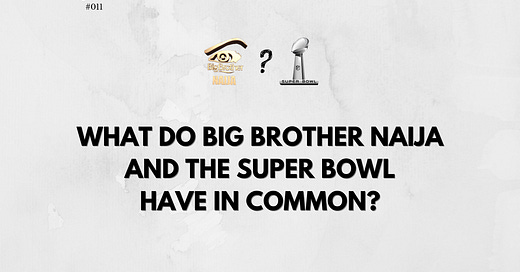



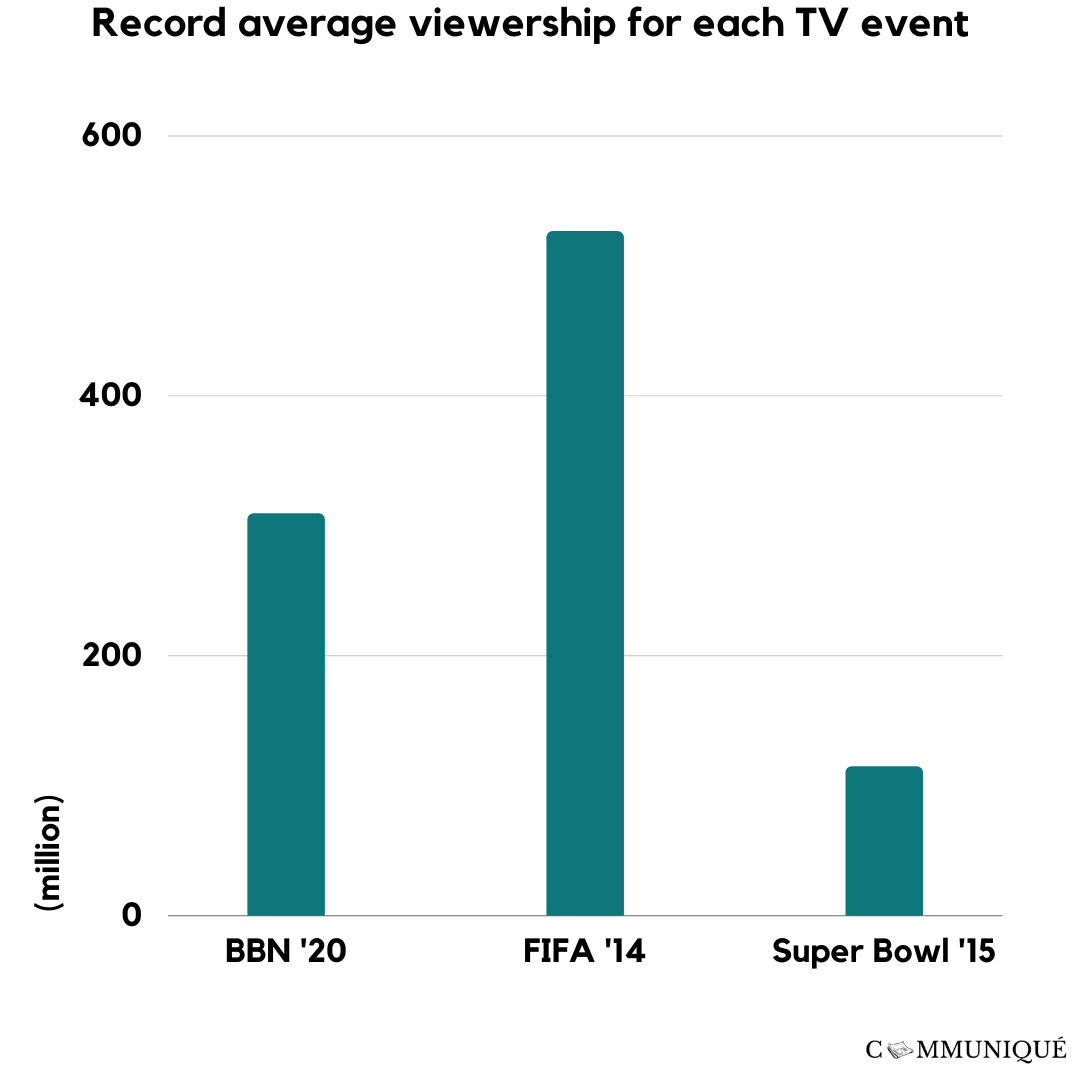

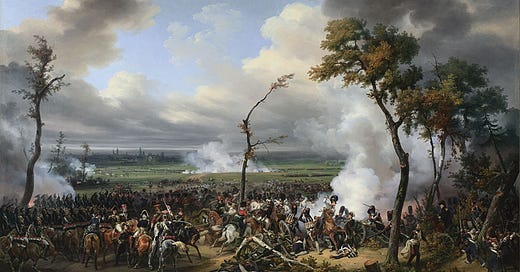

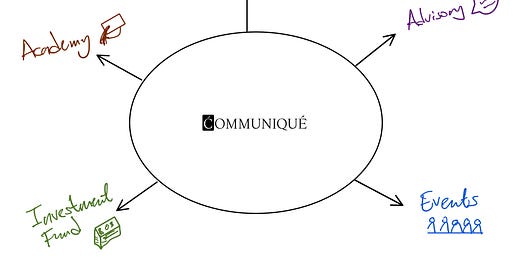

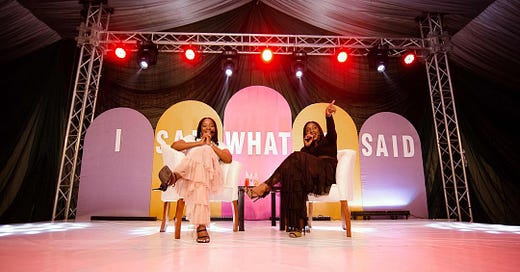

Hey David, very good points you've made. Just a few thoughts I'd like to get off.
TL;DR - Superbowl (SB) has richer advertisers, SB dates are known 5 years in advance (there is permanence), American residents have disposable income, lack of proper analytics in the broadcast industry (E.g Nielsen).
One thing that makes the NFL Superbowl even more commanding is that it has some sort of permanence (a $100bn tv deal gives you that) and ad producers know before hand the exact date it is going to take place for the next 5 years*, so they are able to adequately plan for it. Death taxes, and the super bowl happening in February**.
Big brother on the other hand doesn't have an exact date every year, although they tend to produce and air the program around the summer time (I'm thinking to capture diaspora audiences). So it would be difficult for advertisers to properly plan production and delivery of ads (most ads on Big Brother come in the middle of the season).
Before I continue though, in terms of the build-up to the event, the NFL used to have 16 weeks to build up to the event and with familiar faces that stories could be spun around. BBN on the other hand introduces new faces each season and then those characters in turn need some time to develop and become their own person. There is a gradual buildup in BBN vs the show piece that is the SB.
I made mention of richer advertisers. Generally, the value of the American economy is larger than that of Nigeria (I use Nigeria because it is the primary market for BBN) however if you take a look at a random sample of 5 advertisers from the last edition of both events you get a better picture of the ad prices***.
I'll skip the bit on disposable income because I do not have sufficient expertise in economics to properly break it down without using anecdotal evidence.
Lastly, the source of DSTv's numbers are self-reported figures. Without an independent organisation properly reporting on viewership figures, a lot of media sales will require on how well the salesperson pushes the customer not the exact value they are getting for their money. That said, a lot of the brand managers I know, will try to pay the lowest amount possible (while looking to get the greatest benefit possible) and when you pair those two situations you get the price that is being paid. Organisations like Nielsen will help solve this issue but until then, let the best man win.
PS: Just to add though, the NFL Superbowl is a global broadcast by design while BBN is a regional broadcast under license of the show owners, so there is little they can do to provide official overseas channels if they were to increase their numbers and advertising appeal.
*Superbowl dates: https://www.nbcsports.com/washington/football-team/super-bowl-locations-2020-2021-2022-and-beyond
**The timing of the superbowl has been adjusted starting from the 2021 season due to a new collective bargain agreement between the NFL and NFL Players Association last year that opted to include an additional regular season game which has now moved the Superbowl date by one week.
***Here's a list of SB advertisers https://www.businessinsider.com/super-bowl-2020-all-the-commercials-that-will-run-in-2020-1 and a list of BBN advertisers https://www.bigbrothernaija.net/big-brother-naija-2020-season-5-lockdown-sponsors/
As usual, this is brilliant. I always have my mind opened and fed whenever I visit this place. That said, I think you are indeed spot on. I am not a fan of BBN, but I have always wondered about the advertising potentials it has, especially since the fan base cuts across literally every possible demographic you can imagine - gender, age, income and even education. This is huge.
Your point about the storytelling quality, linked with the dearth of talent in the industry, brings us back to my dissertation which you graciously participated in. The talents required to creatively milk the potentials of opportunities like the BBN is simply short in supply. This is where much of the work needs to be done.
Your point about preference for "functionality over virality" (you captured the phenomenon in a way that is very novel to me -thanks for opening my eyes wider) is a very valid one. Advertisers must make a decision between having the maximum benefit NOW or the maximum that never stops giving over a long period of time.